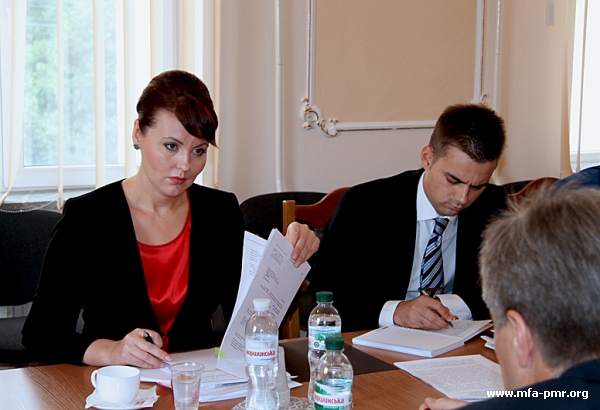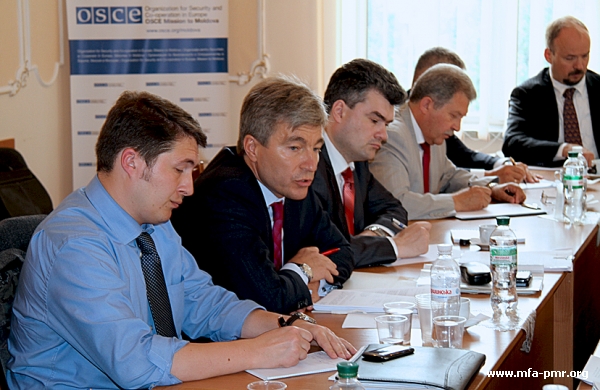It just proves that the government of Pridnestrovie is taking effective efforts to individually support major economic agents - the pacesetters of the economy, so that they could simply preserve the jobs. And if Pridnestrovie did not conduct foreign economic activity, we would not be talking about a blockade, but rather about a social catastrophe”, said Nina Shtanski during the briefing. According to the Minister, release of Pridnestrovian transport capacity seems now more pressing than ever. Removal of mutual restrictions between Moldova and Pridnestrovie, as she said, will enable business to obtain additional ways to sell their products against limited access of Pridnestrovian companies on the Ukrainian market. Nina Shtanski expressed her hope that appeals of Pridnestrovie to continue substantive discussions on this matter would be heard by the Moldovan side. The participants of the meeting agreed on the need to organize the dialogue between economic experts in the near future. Within the discussion, the parties exchanged their views on the prospects for the extension of the Protocol Resolution “On the Principles of the Resumption of a Full-Scale Railway Communication through the Territory of Pridnestrovie” of March 30, 2012. Nina Shtanski assessed the document as one of the most effective mechanisms for cooperation between the parties and proposed to prolong it. She pointed to significant savings for both Moldovan and Pridnestrovian economic entities due to the full functioning of the Pridnestrovian section of the railway. “The money saved by Moldovan economic entities today has totaled $9 mln. and by Pridnestrovian enterprises – $6 mln. Here I mean the money that the enterprises would have spent if they had used other logistic opportunities. We are convinced it can be of critical importance for the businesses when considering certain contracts. As regards the transit of Moldovan cargo using the Pridnestrovian rail, we can state that over the period since the signing of the Agreement the amount of various cargo transited both from Moldova to Ukraine and other countries via Pridnestrovie and to Moldova itself has reached nearly one and a half million tons”, cited Nina Shtanski at the briefing. She also marked that despite the “complicated relations between Pridnestrovie and Moldova”, “interaction in the field of railway communication is probably the only example where over the years of work of this mechanism the sides have not received a single complaint either from relevant services or from economic agents and there has been no need for the political representatives to interfere”. The Minister particularly focused on another five criminal cases initiated since the last meeting of the political representatives, this time against officials of the Migration Department of the PMR's Interior Ministry for Dubossary Region. As noted earlier, initiation of politically motivated criminal cases represents a major obstacle to an efficient and equal dialogue between the sides, including within the international “5+2” format. In this regard the Pridnestrovian side confirmed its own initiative to hold a regular meeting of the Permanent Conference in Pridnestrovie and Moldova. Nina Shtanski stressed that such a proposal is not a new one for the negotiation process. Thus, the Special Representative of the OSCE Chairperson-in-Office originally proposed to hold the first round of this year in Tiraspol and Kishinev, but due to technical difficulties eventually the meeting was held in Vienna. The Minister also pointed out that in the current circumstances a meeting in Pridnestrovie and Moldova might be more efficient, as it would allow international “5 + 2” participants to get the necessary information at first hand through the meetings with the leadership of the parties, as well as with the officials against whom criminal cases were initiated. In the development of the agreement reached during the last meeting of the political representatives, Nina Shtanski provided the Moldovan side with the comprehensive information about the Pridnestrovian regulatory legal acts establishing the procedure for migration control of foreign citizens at the PMR's border.
She emphasized that the measures taken in Pridnestrovie to upgrade the existing checkpoints aim to accelerate and simplify the procedure of the State border crossing.
Nina Shtanski and Yevgeny Karpov discussed foreign economic activity problems and prolongation of the Resolution on the resumption of the railway communication through PridnestrovieToday, the Tiraspol office of the OSCE Mission hosted a regular meeting between political representatives of Pridnestrovie and the Republic of Moldova Nina Shtanski and Yevgeny Karpov.
The main topic of the meeting was the prospects for economic cooperation between the Republic of Moldova and the PMR. It is known that work in this area is carried out in two main directions: unblocking Pridnestrovian foreign economic activity and removal of mutual restrictions, impeding increase in trade turnover between the parties.
Nina Shtanski noted that in view of the difficult economic situation in Ukraine the removal of artificial barriers in trade should become the common interest of both sides of the negotiation process. She recalled that Pridnestrovie was still waiting for a written response from the Moldovan side to the economic presentations made by Pridnestrovie during the Permanent Conference meeting in Vienna on June 5-6 and at the Conference in Freising on June 10-11.
The Foreign Minister said that instead of proposals on this issue from the Moldovan side, today the Pridnestrovian side heard “another set of arguments stating that there is no blockade” and that allegedly the problem does not exist.
“We had to remind our Moldovan colleagues that statistical data of 2013 and 2012 on economic activity of our entities is not an argument for absence of blocking actions from the Republic of Moldova. It just proves that the government of Pridnestrovie is taking effective efforts to individually support major economic agents - the pacesetters of the economy, so that they could simply preserve the jobs. And if Pridnestrovie did not conduct foreign economic activity, we would not be talking about a blockade, but rather about a social catastrophe”, said Nina Shtanski during the briefing. According to the Minister, release of Pridnestrovian transport capacity seems now more pressing than ever.
Removal of mutual restrictions between Moldova and Pridnestrovie, as she said, will enable business to obtain additional ways to sell their products against limited access of Pridnestrovian companies on the Ukrainian market. Nina Shtanski expressed her hope that appeals of Pridnestrovie to continue substantive discussions on this matter would be heard by the Moldovan side.
The participants of the meeting agreed on the need to organize the dialogue between economic experts in the near future.
Within the discussion, the parties exchanged their views on the prospects for the extension of the Protocol Resolution “On the Principles of the Resumption of a Full-Scale Railway Communication through the Territory of Pridnestrovie” of March 30, 2012.
Nina Shtanski assessed the document as one of the most effective mechanisms for cooperation between the parties and proposed to prolong it. She pointed to significant savings for both Moldovan and Pridnestrovian economic entities due to the full functioning of the Pridnestrovian section of the railway.
“The money saved by Moldovan economic entities today has totaled $9 mln. and by Pridnestrovian enterprises – $6 mln. Here I mean the money that the enterprises would have spent if they had used other logistic opportunities. We are convinced it can be of critical importance for the businesses when considering certain contracts. As regards the transit of Moldovan cargo using the Pridnestrovian rail, we can state that over the period since the signing of the Agreement the amount of various cargo transited both from Moldova to Ukraine and other countries via Pridnestrovie and to Moldova itself has reached nearly one and a half million tons”, cited Nina Shtanski at the briefing.
She also marked that despite the “complicated relations between Pridnestrovie and Moldova”, “interaction in the field of railway communication is probably the only example where over the years of work of this mechanism the sides have not received a single complaint either from relevant services or from economic agents and there has been no need for the political representatives to interfere”.The Minister particularly focused on another five criminal cases initiated since the last meeting of the political representatives, this time against officials of the Migration Department of the PMR's Interior Ministry for Dubossary Region.
As noted earlier, initiation of politically motivated criminal cases represents a major obstacle to an efficient and equal dialogue between the sides, including within the international “5+2” format.In this regard the Pridnestrovian side confirmed its own initiative to hold a regular meeting of the Permanent Conference in Pridnestrovie and Moldova. Nina Shtanski stressed that such a proposal is not a new one for the negotiation process. Thus, the Special Representative of the OSCE Chairperson-in-Office originally proposed to hold the first round of this year in Tiraspol and Kishinev, but due to technical difficulties eventually the meeting was held in Vienna.
The Minister also pointed out that in the current circumstances a meeting in Pridnestrovie and Moldova might be more efficient, as it would allow international “5 + 2” participants to get the necessary information at first hand through the meetings with the leadership of the parties, as well as with the officials against whom criminal cases were initiated.
In the development of the agreement reached during the last meeting of the political representatives, Nina Shtanski provided the Moldovan side with the comprehensive information about the Pridnestrovian regulatory legal acts establishing the procedure for migration control of foreign citizens at the PMR's border. She emphasized that the measures taken in Pridnestrovie to upgrade the existing checkpoints aim to accelerate and simplify the procedure of the State border crossing.









